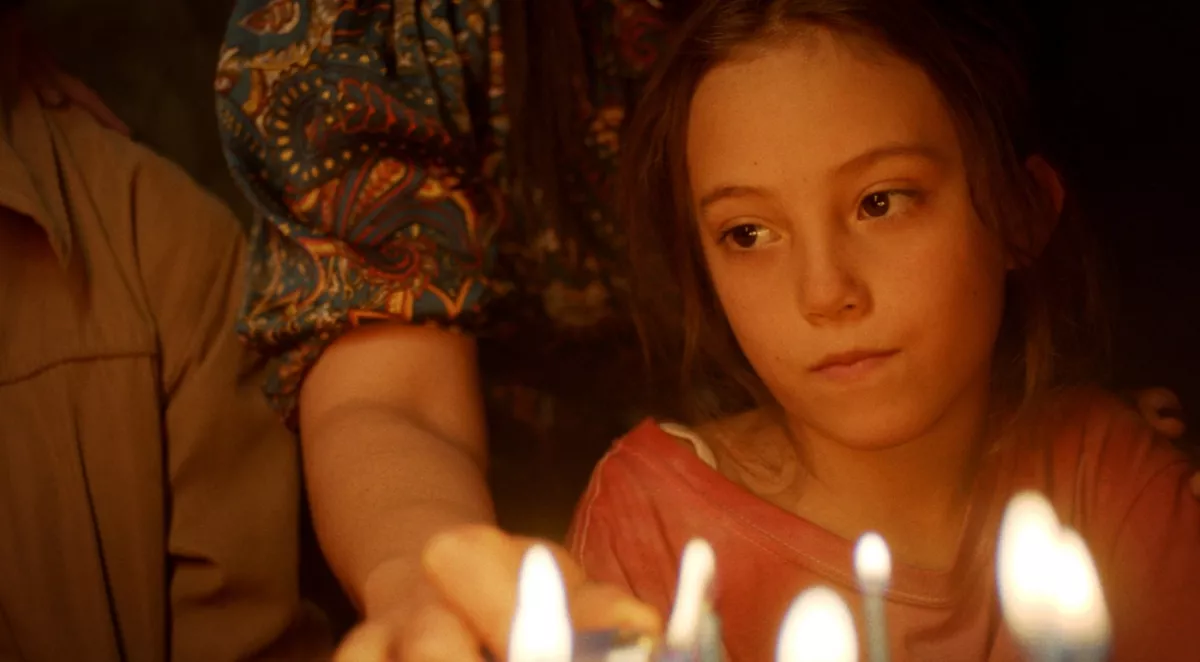In the world of Tótem, directed by the visionary director Lila Avilés, we are gently drawn into the life of young Sol, portrayed with a depth beyond her years by Naíma Sentíes. This poignant narrative, set amidst the vibrant hues of Mexico, tells the story of Sol’s journey as she navigates the complexities of her father Tonatiuh’s (‘Tona’) illness, a role brought to life with aching authenticity by Mateo García Elizondo. The film unfolds like a delicate dance of light and shadow, weaving a story that intertwines the simplicity of a child’s perspective with the intricate tapestry of familial bonds and the echoes of a cultural heritage.
This cinematic odyssey, a gem in the rich tapestry of the Mexican New Wave, becomes a poignant reflection of my own early years, filled with wonder, discovery, and the nascent understanding of grief’s multifaceted nature.
A Symphony of Emotions: The Cast’s Harmony

In Tótem‘s enchanting narrative, the cast masterfully crafts a symphony, each actor dynamically contributing their unique essence to this emotional orchestra. Montserrat Marañon, portraying Aunt Nuria, skillfully injects a compelling mix of resilience and vulnerability into her character. Similarly, Iazua Larios, embodying Sol’s mother, vividly paints a picture of silent strength and transformative love – her free-spirited nature is profoundly felt, even in her absence, compelling Sol to forge her own path.
Furthermore, the ensemble vividly animates a story that gracefully navigates the delicate balance between personal struggles and the universal ebbs and flows of sorrow and growth. Following Lucia’s departure, Sol finds herself under the watchful yet relaxed supervision of her aunts. In this setting, Nuria, overwhelmed with stress, seeks refuge in alcohol, her actions reflecting life’s chaotic beauty. Concurrently, her daughter Ester (Saori Gurza) reigns from her fridge-top kingdom.
Moreover, the film introduces Sol’s stoic psychologist grandfather Roberto (Alberto Amador), a likely cancer survivor, evident from his electrolarynx, and Tona’s trusted nurse, Cruz (Teresita Sánchez), and Sol’s confidante. These characters further enrich the story’s depth.
In this household, where the ordinary intersects with the mystical, Alejandra, the older sister, dives into a personal metamorphosis. Her hair dyeing intertwines with the home’s spiritual cleansing, creating a tapestry where financial concerns and spiritual journeys clash. This scenario vividly illustrates Cruz, the quiet observer, pondering the just compensation for her dedicated caregiving amidst the family’s idiosyncrasies.
Each character, from Ester’s elevated perch to the mother’s intermittent presence, significantly enhances Tótem‘s narrative fabric. They create a mosaic that merges the everyday with the extraordinary, weaving together the personal with the profound.
Cinematic Poetry: The Visual Mosaic

Furthermore, the visual storytelling in Tótem is nothing short of poetic. Through Avilés’ visionary lens, every frame becomes a testament to the beauty and complexity of seeing the world through a child’s eyes. The meticulous attention to detail, the play of light and shadow, and the vivid portrayal of everyday moments all combine to create a mosaic that is both breathtakingly beautiful and deeply evocative. It’s as if each scene is carefully crafted to evoke the sense of wonder and curiosity that defines childhood, while also painting a larger picture of life’s poignant realities.
Avilés uses her camera as a window into Sol’s world, capturing the minute details that an adult eye might miss but which hold a universe of meaning for a child. The close-ups of insects, the play of light and shadow, the textures of everyday objects – all these are rendered with a vividness that takes me back to the days when the world was a canvas of endless possibilities, each detail a story waiting to be explored.
Echoes of the Past: Colonialism’s Shadow

Moreover, Tótem delves into the deeper veins of Mexico’s collective soul, exploring the lasting scars of colonialism and its impact on indigenous communities. This theme is woven through the narrative with subtle grace, reflecting not only the personal struggles of Sol and her family but also the silent, enduring grief of a nation. The film becomes a canvas, portraying the intricate relationship between personal loss and the collective mourning of a people whose history is marked by centuries of colonial influence.
As the film unfolds, we are taken on a journey that is both intimate and expansive. Tótem is an experience that resonates on a deeper, more universal level. It speaks to the child within each of us, reminding us of the innocence and simplicity of youth, while also acknowledging the complexities and nuances of growing up and facing life’s inevitable challenges.
Tótem: A Breathing Piece of Art

In its essence, Tótemis a celebration of life in all its forms. It’s a reminder of the resilience of the human spirit, the enduring strength of familial bonds, and the unbreakable connection to our cultural roots. The film stands as a powerful testament to the ability of cinema to capture the essence of our shared human experience, shining a light on the often-overlooked corners of our existence and bringing to the forefront the stories that need to be told.
Reflecting on Tótem, it becomes clear that this film is more than just a narrative; it’s a living, breathing piece of art that weaves together the threads of childhood innocence, the depth of human emotion, and the complex fabric of history. It’s a window into the soul of a nation, revealing the collective grief and resilience of Mexico, a land steeped in history and spirit, yet burdened by the legacy of its colonial past.
Tótem is a cinematic journey that stays with you long after the final credits roll, echoing in the chambers of your heart, a hauntingly beautiful reminder of the power of storytelling.

